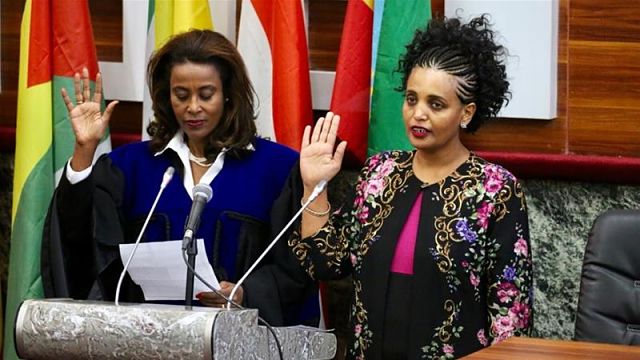 In Ethiopia the election has been postponed while the country has declared a State of Emergency due to the Coronavirus pandemic. (Photo: Birtukan Mideksa (right), the head of the National Electoral Board of Ethiopia, being sworn in on November 22nd, 2018)
In Ethiopia the election has been postponed while the country has declared a State of Emergency due to the Coronavirus pandemic. (Photo: Birtukan Mideksa (right), the head of the National Electoral Board of Ethiopia, being sworn in on November 22nd, 2018)
Tadias Magazine
By Tadias Staff
Updated: May 18th, 2020
New York (TADIAS) – As Ethiopian Americans we were eagerly looking forward to two major elections this year, which directly impact our lives here in the U.S. as well as our communities back in Ethiopia. But that was before the COVID-19 pandemic turned everything upside down.
In just a matter of weeks the U.S. unemployment rate has gone from the best in 50 years to the worst since the Great Depression altering the conversation surrounding the 2020 U.S. election. And in Ethiopia the national election has been canceled for now while the country has declared a State of Emergency due to the Coronavirus pandemic.
The election delay in Ethiopia has also exposed an impending constitutional problem: What happens when the ruling party’s term of office expires in the next few months before an election is held? Interestingly, the historic legal predicament has also sparked a robust civil discourse in social media in regard to the role of the constitution as well as possible solutions for next steps, which is a pleasant surprise in comparison to previous election seasons. The timely and elaborate discussions include diverse and informative viewpoints from scholars, legal experts, journalists, civil society leaders, government advisors as well as politicians.
In the case of Ethiopia, the 2020 vote was supposed to be the first transparent and credible election in the nation’s history coming on the heels of prior highly contested election processes. In a statement announcing the decision in late March the National Electoral Board of Ethiopia (NEBE) said: “After conducting detail assessment of the impact COVID-19 would have on its operation, NEBE decided to cancel the current electoral calendar and suspend elections operations of the coming national elections planned to be conducted in August 2020.”
In a recent Facebook post Prime Minister Abiy Ahmed further warned that his rivals were “trying to exploit uncertainty created by the coronavirus pandemic to seize power, risking instability,” AFP reported, adding that the opposition was quick to push back asserting that Abiy’s comments amounted to “a threat to silence and intimidation.”
As AFP notes: “Ethiopia’s constitution does not spell out how the postponement should be handled — a situation which has stoked concerns that Abiy’s government may soon face legitimacy issues,” and this month “lawmakers in parliament’s lower house formally asked the upper house to provide a ‘constitutional interpretation’ that could offer a way out of the impasse.”
Meanwhile, in the U.S. several voter-driven and non-partisan initiatives are similarly underway across the country aiming to diversify the existing voting options for the 2020 election season including this campaign led by former first lady Michelle Obama who is pushing for voting by mail, early in-person voting, and online voter registration. Unfortunately, the White House has also created a firestorm after Trump advisor and son-in-law Jared Kushner indicated that he was ‘not sure’ that the November 3rd elections would be held as scheduled. The Washington Post reported that “hours after his remarks to Time Magazine generated a strong reaction on social media [last week], Kushner issued a clarification, saying he was unaware of and not involved in any “discussions” about changing the date of the 2020 election,” adding that “neither Trump nor Kushner as his adviser has any legal authority to change the timing of the presidential election.”
Americans are also openly discussing another potential concern – which the Washington Post describes as the “need to prepare for the possibility of Trump rejecting election results.”
Below are links to some of the latest online arguments and analyses taking place in Ethiopia as well as the Diaspora:
To resolve constitutional dilemma, interpretation is insufficient: by Girmachew Alemu
Ethiopia’s poll has been pushed out by COVID-19. But there’s much more at play: by Mulugeta G Berhe
Seeking constitutional interpretation: Not ideal but legitimate: by Yonatan T. Fessha
A constitutional path towards political normalization: by Mamo Mihretu
The limits of legal solutions: by Mehari Taddele Maru
Elections and emergencies show constitutional limits on states’ rights: by Brightman Gebremichael
Beating around the bush on the constitutional conundrum: by Adem Kassie Abebe
Ethiopian regions cannot hold elections without federal approval: by Markos Debebe
Ethiopia’s Impending Constitutional Crisis and why we need a political solution: by Jawar Mohammed
—
Join the conversation on Twitter and Facebook.

























